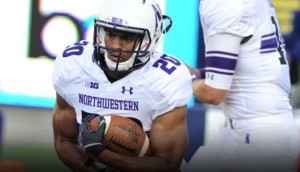A union for college football players? It’s too late

A NOT SO PERFECT UNION: A National Labor Relations Board regional director has ruled that football players at Northwestern University have the right to form a labor union. Photo courtesy of Northwestern University.
By Rob Nikolewski │ New Mexico Watchdog
Big-time college sports has been a mess for decades, but establishing a football players’ union won’t fix things. In fact, it will probably lead to more headaches.
A little more than a week ago, a National Labor Relations Board regional director ruled that players at Northwestern University (where I once attended) are employees, not students of the university, and therefore have the right to collectively bargain and form a union.
The ruling has freaked out the NCAA, which has run major college athletics essentially since the turn of the last century. While the NCAA is about as lovable as Vladimir Putin with a toothache, the organization makes some valid points about the shortcomings in the ruling.
At issue, though, is one central question: What do scoring touchdowns or dunking a basketball have to do with higher education?
The answer, essentially, is nothing. But schools and the NCAA have been trying to square that unsquareable circle ever since the days when Harvard and Yale, rather than Ohio State and Alabama, were filling stadiums on Saturdays.
One of the arguments the NRLB administrator cited was the fact the Northwestern football program generated $30.1 million in revenue. The case for paying student-athletes has been around for years and, given the fact that NCAA television contracts are worth more than a billion dollars, it has some merit.
But if part of the rationale is based on the fact that football and men’s basketball make so much money for schools, does that mean students who compete in non-revenue sports (swimming, track and field, golf) can’t unionize?
Further, since most women’s sports don’t make money, does that mean female athletes cannot unionize? There’s a Title IX lawsuit waiting to happen.
The ruling now goes before the full NRLB in Washington on appeal. In the wake of the decision, some have called on the NCAA to make changes.
Among the suggestions: Paying football and basketball players. But if you pay them, you’ve gotta pay every athlete, right? What about paying those on academic scholarships?
One sportswriter called for creating an “athletics major.”
The notion that college athletes today are innocent, naïve angels is disingenuous. The truth is, a lot of college football and basketball players are simply not interested in academics. They want to play pro ball and go to Big Time U to try to fulfill those dreams.
Having said that, it’s scandalous that when the vast majority don’t make it, so many have no marketable skills.
I’ve always believed a better system could have been established decades ago.
If we had, say, an AT&T Tigers football team rather than the LSU Tigers, we could have dispensed with this whole charade. Players could be paid. Companies would compete for the best high school players and offer them contracts.
Since athletes’ careers are short and injuries devastating, there would be an incentive for companies to lure the best players by offering them, upon the end of their careers, a) jobs with the company, b) free job training at, say, trade schools, or c) four years of tuition paid for at a state university, should the player have the inclination and the academic potential to earn a degree.
That ship has sailed. It’s never going to happen because sports loyalties have already been ingrained by alumni and fans.
The best practical solution, I think, is this: Offer eight-year scholarships that can run in non-consecutive years.
That way if Mr. Basketball doesn’t make it in the pros, he can return to school later in life and earn a degree.
Wouldn’t those obligations crowd out the potential student enrollment in subsequent years? Precisely. Such a system would make college administrators think more carefully about handing out athletic scholarships. Right now, there’s no obligation on the part of the school once a jock’s four years are up.
You want to keep your multi-million-dollar program? Fine. But there’s a responsibility — on the parts of the players and the schools — that comes once the games are over.
Contact Rob Nikolewski at rnikolewski@watchdog.org and follow him on Twitter @robnikolewski







